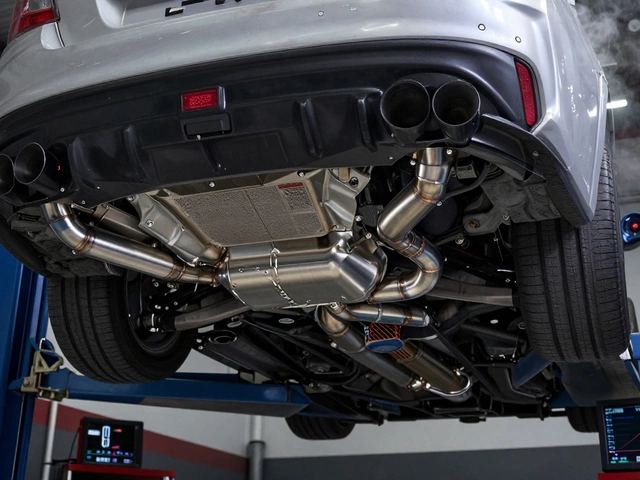Upgrading your exhaust isn’t just about making your ride sound mean. Plenty of folks start thinking about a custom exhaust because they want more power or even a bit better fuel economy. But do you really get what’s promised? Or is it mostly hype from the aftermarket world?
If you pop open the hood—or crawl under your car—what you’ll really notice after an exhaust swap depends on what you’re driving and what you’re looking for. Not all upgrades give the same results. Some people see a nice bump in horsepower, others mostly get a rumble that turns heads but doesn’t move the needle on performance.
Sure, there’s the thrill of driving something that sounds and feels different. But before you put down serious cash, you’ll want to know what’s actually changing. There are different setups out there: cat-backs, axle-backs, headers, and full systems. Each one has a slightly different impact, and not all are created equal—your Civic isn’t going to turn into a track monster overnight.
- What Happens When You Upgrade Your Exhaust?
- Performance Gains: Fact or Fiction?
- Sound and Style: More Than Just Noise
- Fuel Efficiency: Can an Exhaust Save You Money?
- The Legal Side: What Could Land You in Trouble
- So, Is an Exhaust Upgrade Right for You?
What Happens When You Upgrade Your Exhaust?
Swapping out your exhaust isn’t just for show. When you install a custom exhaust, you’re actually changing how your engine breathes. The whole idea is to help exhaust gases leave the engine faster and with less restriction. That can lead to several changes you’ll notice right away—and some you might not expect.
First up, you often reduce backpressure. Backpressure is basically the resistance your exhaust gases run into as they leave the engine. Less backpressure can mean a bump in horsepower and a more responsive feel when you hit the gas. But the real-world gains from exhaust upgrades depend on your car. For example, turbocharged engines usually benefit more than small four-cylinders.
After an upgrade, the sound is usually the next biggest change. Stock exhausts are built to keep things quiet. The second you slap on a performance exhaust, you’ll get a deeper, sometimes louder tone. Some folks love it, others get dirty looks from the neighbors. It’s a personal thing.
Visually, a new exhaust—think big tips, polished stainless steel, or even double exits—definitely steps up the style game. It’s one of the quickest ways to make your ride stand out in a crowd or at a car meet.
Let’s not forget fuel efficiency. A less restrictive custom exhaust can sometimes help your car use fuel more efficiently. But honestly, unless you drive with efficiency in mind and pair your exhaust with other tweaks, don’t expect wild savings at the pump.
- Performance: Quicker engine response, maybe a few extra horsepower
- Sound: Deeper, sometimes louder exhaust note
- Looks: More aggressive rear end, nicer finishing
- Efficiency: Possible small bump in MPG, but only if paired with other mods
Here’s a quick peek at what you might notice right after installing a custom exhaust:
| Upgrade Type | Common Result |
|---|---|
| Cat-back System | Noticeable sound change, small power boost |
| Axle-back System | Mostly just louder sound |
| Headers | Potentially bigger power gains, more complex install |
Performance Gains: Fact or Fiction?
Everyone talks about performance when it comes to exhaust upgrades. Some swear by huge horsepower jumps just from a quick swap. Reality check: most gains from a bolt-on custom exhaust fall between 2% to 5% horsepower for regular cars. If you’re driving something like a Honda Civic or Ford Escape, don’t expect to suddenly blow past sports cars just because you swapped pipes.
If your car already has a turbo or you’re stacking upgrades (think intake, tune, headers), then you might see more noticeable improvements. But for most daily drivers, it’s more about fine-tuning than massive leaps. Popular exhaust options like cat-back systems usually toss a few extra horses your way—maybe 5–10 if your engine’s happy. Upgrades like full headers or a high-flow catalytic converter can bump those numbers up, but it’s not night and day.
| Exhaust Type | Average HP Gain |
|---|---|
| Axle-back | 1-3 HP |
| Cat-back | 5-10 HP |
| Headers | 10-20 HP (with other mods) |
You also need to think about how these upgrades work. Most stock systems are already pretty efficient. Car makers aren’t out to choke your engine—especially on newer models. As brands like MagnaFlow put it,
“For a noticeable performance increase, pairing a well-designed exhaust with intake and engine tuning is the way to go.”So, unless you’re planning to go all-in, don’t expect miracles from pipes alone.
Here’s the bottom line:
- Small HP gains are possible, mostly for cars with other mods already done.
- You’ll feel the biggest changes on older or turbocharged vehicles.
- Modern stock exhausts are hard to beat on their own.
Sound and Style: More Than Just Noise
Let’s get real—half the folks eyeing exhaust upgrades aren’t just chasing horsepower. They want that growl. A custom exhaust is probably the easiest way to make your car sound like it means business. Whether you’re into deep rumbles, sharp snarls, or something subtle, there’s a setup out there for you.
But sound isn’t just about making noise. Different systems give off their own vibe. For example, a straight-pipe setup will almost always make your ride louder—sometimes way too loud for city streets. Meanwhile, cat-back and axle-back systems keep it cleaner, offering a noticeable rumble without drowning out your daily podcast.
Here are a few facts that help sort out the hype from what you actually get:
- An aftermarket muffler or cat-back exhaust usually bumps up sound by 5-15 decibels. That’s enough for you (and your neighbors) to notice.
- The shape and size of the pipes matter. A wider diameter means deeper sound but can mess with backpressure if you go huge, which isn’t always good for everyday driving.
- Many manufacturers include sound clips online, so you know what you’re getting before you order. Checking these out cuts the risk of ending up with a “garage-band” exhaust when you wanted something refined.
Looks matter, too. Most custom exhaust setups are built with shiny stainless steel or even carbon fiber tips—basically, stuff made to catch eyes in parking lots or at the next cars-and-coffee. While these don’t boost performance, there’s no rule saying your ride can’t look slick.
If you’re worried about the legal side, pay attention to your local sound laws. States like California have a 95-decibel limit, and tickets for a too-loud exhaust upgrade aren’t cheap. Some bolt-ons even come with labels proving they’re street legal, so keep that in mind if you don’t want to be hassled.
Bottom line here—sound and style might not make your car faster, but they change how it feels every time you turn the key. Just be honest with yourself about whether you want noise, looks, or both before you place that order.

Fuel Efficiency: Can an Exhaust Save You Money?
Everyone loves the idea of getting more miles out of every gallon. When people talk about exhaust upgrades, fuel efficiency is a hot topic. Here’s the deal: swapping out your stock exhaust for a less restrictive one can, in some cases, help your engine "breathe" better. That means less work for the engine and a chance, though not a guarantee, for better mpg.
But don’t expect miracles. On average, you might see a 2-5% bump in fuel economy with some custom exhaust setups. That’s under perfect conditions and usually only if your old system was really choking things up. If you’re gunning your engine for the new sound all the time, any gains go out the window.
| Stock Exhaust | Cat-Back Upgrade | Header Upgrade |
|---|---|---|
| 25 MPG | 26-26.5 MPG | 26-27 MPG |
The biggest gains tend to happen on trucks, SUVs, or older cars where the factory systems are pretty restrictive. Modern cars are usually tuned for decent efficiency already, so don’t bank on big savings unless you have a reason.
If you’re really going after savings, pairing an exhaust with other mods—like a high-flow air filter or engine tune—might help. But if fuel efficiency is your only goal, your money is often better spent making sure your tires are pumped up and you’re not hauling extra junk around in the trunk.
Bottom line: a performance exhaust can help, but don’t expect to get rich off the difference. It’s more about the whole package—not just what comes out the tailpipe.
The Legal Side: What Could Land You in Trouble
Here’s where a lot of folks hit a wall. You can bolt on the best exhaust upgrades out there, but it won’t mean a thing if it gets you in trouble with the law. Different places have different rules, and what’s cool in Texas might get you a fat ticket in California.
Noise is the big one. Most states have laws about how loud your car can be. For example, California limits all cars made after 1970 to 95 decibels at a stationary 20-inch test. New York has cracked down hard too, so if your custom exhaust is extra loud, expect unwanted attention from the cops—and possibly a ticket that can reach up to $1,000. Sometimes, law enforcement might even order a state inspection or tell you to swap back to your factory parts.
Emissions are another headache. In the U.S., tampering with or removing catalytic converters is illegal under federal law (Clean Air Act), and penalties can be steep. Your car could also fail its annual emissions check, leaving you stranded at inspection time. Stock exhausts come with emissions controls for a reason, and a lot of custom exhaust systems can mess with how your car handles exhaust gases. This is a deal-breaker in states with strict smog rules, like California, New York, and Colorado.
Here’s a quick look at how states differ:
| State | Max Legal Decibel | Emissions Testing Required |
|---|---|---|
| California | 95 dB | Yes |
| Texas | Varies | No (for most counties) |
| New York | Varies, but strict | Yes |
If you want to avoid drama:
- Check your state and local laws before upgrading your exhaust. Google your DMV’s official website—don’t just trust forum rumors.
- Look for performance parts that have a CARB E.O. number (meaning they’re approved by the California Air Resources Board) if you’re in a state that follows CARB rules.
- Keep your old parts, just in case you need to switch back for inspection—or to sell the car.
Last thing: insurance companies might care too. Some plans won’t cover damage or theft if you’ve done illegal mods. So, double-check your policy the next time you consider a flashy new exhaust upgrade.
So, Is an Exhaust Upgrade Right for You?
This is where it really pays to be honest with yourself. Ask what you actually want out of a custom exhaust. Do you want more punch when you hit the gas, a deeper sound, or just a cooler look? Not everyone chases the same thing, so figuring out your real goal is step one.
If it’s pure performance you care about, know that most modern cars already have pretty dialed-in exhaust systems from the factory. Swapping for aftermarket doesn’t always mean big horsepower jumps. You might see 2-5% gains on a naturally aspirated engine—so if your car starts with 200 horsepower, you may end up with only 4-10 more. Turbocharged cars sometimes see a bit more, but don’t expect miracles unless you’re pairing the exhaust swap with other upgrades.
| Vehicle Type | Average HP Gain |
|---|---|
| Stock (Non-Turbo) | 2-5% |
| Turbocharged | 5-10% |
If you’re about the noise, then a performance exhaust is going to give you what you want, no question. Just remember: what sounds fun to you might get old on the highway or annoy your neighbors. Not every system comes with a quiet option, so check for setups with adjustable or modular mufflers if that matters.
Now, on street cars, promises of better fuel efficiency are hit or miss. Some drivers see a mild improvement, but often it’s not enough to justify the cost if that’s your only goal. If you’re hoping to save on gas, you might be let down.
Don’t forget about the legal side. Lots of states and cities have strict rules on noise and emissions. Fail those tests, and you could end up with a fine or have to swap everything back just to get your registration renewed.
- If you want a louder, sportier sound, go for it.
- If you’re after significant power gains, do your homework—pairing exhaust upgrades with engine tuning and other mods helps.
- If cost is a big factor, add up the parts, labor, and possible legal costs. It’s rarely a cheap project.
- If you worry about warranties, check if swapping your exhaust voids any of them.
It comes down to what makes you happy. For some, that growl or hint of extra power is worth every penny. For others, the reality doesn’t always live up to the hype. Take a hard look at your budget and your real goals, read real-world reviews for your specific car, and don’t let flashy marketing make the decision for you.




